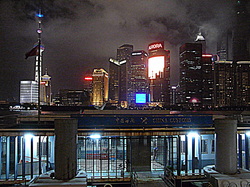
State Control and the Effects of Foreign Relations on Bilateral Trade
Christina Davis, Andreas Fuchs and Kristina Johnson
Published in: Journal of Conflict Resolution 63(2): 405-438, February 2019
Abstract
Can governments still use trade to reward and punish partner countries? While WTO rules and the pressures of globalization restrict states’ capacity to manipulate trade policies, politicization of trade is likely to occur where governments intervene in markets. We examine state ownership of firms as one tool of government control. Taking China and India as examples, we use new data on imports disaggregated by firm ownership type, as well as measures of political relations based on bilateral events and UN voting data to estimate the effect of political relations on import flows since the early 1990s. Our results support the hypothesis that imports controlled by state-owned enterprises (SOEs) are more responsive to political relations than imports controlled by private enterprises. This finding suggests that politicized trade will increase as countries with partially state-controlled economies gain strength in the global economy.
Published paper
Supplementary information
Accepted manuscript
Working paper (October 2016)
Working paper (October 2014)
Presentations at conferences and workshops
Christina Davis, Andreas Fuchs and Kristina Johnson
Published in: Journal of Conflict Resolution 63(2): 405-438, February 2019
Abstract
Can governments still use trade to reward and punish partner countries? While WTO rules and the pressures of globalization restrict states’ capacity to manipulate trade policies, politicization of trade is likely to occur where governments intervene in markets. We examine state ownership of firms as one tool of government control. Taking China and India as examples, we use new data on imports disaggregated by firm ownership type, as well as measures of political relations based on bilateral events and UN voting data to estimate the effect of political relations on import flows since the early 1990s. Our results support the hypothesis that imports controlled by state-owned enterprises (SOEs) are more responsive to political relations than imports controlled by private enterprises. This finding suggests that politicized trade will increase as countries with partially state-controlled economies gain strength in the global economy.
Published paper
Supplementary information
Accepted manuscript
Working paper (October 2016)
Working paper (October 2014)
Presentations at conferences and workshops
- Beyond Basic Questions Workshop, Leibniz University Hannover, Germany (06/2015)
- Global Asias Conference, Penn State University, USA (04/2015)
- Invited talk at the Research Institute of International Trade and Industry, Tokyo, Japan (07/2014)
- Annual Convention of the International Studies Association, Toronto, Canada (04/2014)
- Seminar of the Department and Program of East Asian Studies, Princeton University, USA (04/2014)
- 19th Diplomatic Forum at the Center for International Studies, Seoul National University, South Korea (07/2013)
- Invited talk at University of Tokyo, Japan (07/2013)
- Invited talk at Waseda University, Tokyo, Japan (07/2013)
- International Political Economy Colloquium, University of Pittsburgh, USA (01/2013)
- Conference on the Politics of the Changing World Economy, Goa, India (01/2013)
- Annual Conference of the International Political Economy Society, University of Virginia, Charlottesville, USA (11/2012)
